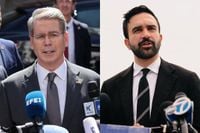United States Treasury Secretary Scott Bessent delivered a blunt message to New York City this week, declaring that the federal government will not step in to rescue the city financially if voters elect Democratic nominee Zohran Mamdani as mayor. Bessent’s comments, made during a Wednesday appearance on Fox Business Network’s “Mornings with Maria,” have sent shockwaves through the city’s political and economic circles, reigniting memories of a fraught chapter in New York’s history and raising fresh questions about the city’s fiscal future.
“It will be the same thing that Gerald Ford said: ‘Drop dead,’” Bessent told anchor Maria Bartiromo, referencing a notorious 1975 New York tabloid headline that captured the city’s sense of abandonment when then-President Ford refused to bail out New York as it teetered on the brink of bankruptcy. In a twist of historical irony, Ford never actually uttered those words, but the phrase has become synonymous with federal indifference to the city’s financial troubles. Bessent doubled down, saying, “I guarantee you — and there are not a lot of things in life that are sure — that New York City will be coming to the federal government for a bailout if the Mamdani plans are implemented.” (Al Jazeera, Reuters)
Bessent’s warning comes at a pivotal moment for New York. Zohran Mamdani, a 31-year-old Democratic socialist, is the clear frontrunner in the mayoral race, leading by double digits in 18 different polls ahead of the November 4, 2025, election. Mamdani’s campaign has energized progressive voters with a raft of ambitious proposals, including universal child care, a pilot program for city-run grocery stores, free city buses, and rent freezes. These initiatives would be financed by raising the corporate tax rate and increasing taxes on New Yorkers earning more than $1 million annually by 2 percent. (Al Jazeera, Reuters)
But Bessent, a key figure in President Donald Trump’s administration, has cast doubt on the fiscal sustainability of Mamdani’s platform. He pointedly referred to Mamdani as the “socialist protege” of Democratic Senator Elizabeth Warren, who herself has been vocal about federal bailouts in other contexts. Bessent stopped short of specifying which elements of Mamdani’s agenda he believes could trigger a financial crisis, yet he was unwavering in his prediction: “New York City will be coming to the federal government for a bailout if the Mamdani plans are implemented.” (Reuters)
The city’s economic backdrop has only heightened the stakes. According to Al Jazeera, New York City’s job market has cooled significantly under Trump’s economic policies. In the first half of 2025, the city added fewer than 1,000 jobs—a sharp drop from the 66,000 jobs created during the same period the previous year. Nationwide, the labor market has also slowed, with only 22,000 jobs added in August and the ADP private payroll report showing just 54,000 new private sector jobs, nearly half the previous month’s figure. (Al Jazeera)
Despite the city’s economic woes, Mamdani’s proposals remain popular among many New Yorkers. An Al Jazeera analysis found that his campaign offers detailed funding plans for each initiative. The proposed tax changes, however, would require approval from New York State Governor Kathy Hochul, who last week endorsed Mamdani over her former colleague, Andrew Cuomo. Cuomo, who lost the Democratic primary to Mamdani, is now running as an independent, adding another layer of complexity to the upcoming election. (Al Jazeera)
The Trump administration’s relationship with New York City has been fraught throughout 2025. Earlier this year, the Department of Transportation threatened to withhold federal funding over the city’s congestion pricing policies, while the Department of Education made similar threats regarding protections for transgender students in city schools. The White House also cut funding allocated by Congress through FEMA, money intended to help the city prevent terror attacks. These moves underscore a broader strategy of using federal purse strings to influence city policy—a strategy that some see as punitive, while others argue it is a necessary check on what they view as fiscal recklessness. (Al Jazeera)
For his part, Mamdani has not responded directly to Bessent’s remarks. His office did not return requests for comment from either Al Jazeera or Reuters. Nonetheless, his supporters argue that the city’s social safety net is in dire need of expansion, especially as economic inequality widens and essential services become increasingly inaccessible for working-class families. They point to the overwhelming support for his proposals in recent polls as evidence that New Yorkers are ready for bold change, even if it means challenging the status quo in Albany and Washington.
Opponents, however, warn that the city cannot afford such sweeping reforms. They cite the city’s sluggish job growth and the broader national slowdown as reasons to proceed with caution. “You can’t just raise taxes and expect the wealthy and businesses to stay put,” said one business leader who spoke to Reuters on condition of anonymity. “We’ve seen what happens when cities overreach—capital flees, jobs disappear, and the people who suffer most are those the policies were meant to help.”
Governor Hochul’s endorsement of Mamdani adds another wrinkle to the unfolding drama. As the state’s chief executive, Hochul would have to sign off on any changes to the city’s tax structure. Her support suggests she’s betting on Mamdani’s vision, but it also puts her at odds with more centrist Democrats and independents like Cuomo, who argue that the city needs pragmatic leadership, not ideological experiments. Cuomo’s independent run could siphon votes from both camps, making the outcome of the November election even more unpredictable. (Al Jazeera)
Meanwhile, the Trump administration’s hardline stance has injected a sense of urgency into the race. By threatening to withhold federal support, Bessent and his colleagues are signaling that the city’s fate will hinge not just on local decisions but on its relationship with Washington. For some, this feels like déjà vu—a return to the days when New York was left to fend for itself amid fiscal crisis. For others, it’s a necessary wake-up call about the limits of progressive ambition in an era of economic uncertainty.
As the campaign enters its final weeks, the stakes could hardly be higher. Will New Yorkers embrace Mamdani’s vision for a more equitable city, or will fears of financial collapse tip the scales toward a more cautious path? With the memory of 1975 looming large and the city’s economic future hanging in the balance, all eyes are now on the voters—and on Washington, where the next chapter in this high-stakes drama is sure to unfold.
In the end, New York’s choice will reverberate far beyond its five boroughs, serving as a bellwether for the nation’s ongoing debate over the role of government, the limits of federal support, and the future of America’s great cities.




